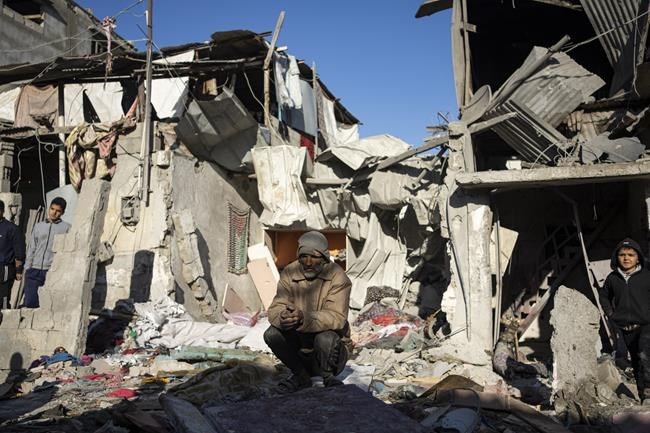OTTAWA — Israel's envoy to Canada is joining calls for the federal Liberals to clearly state Ottawa's position as the International Court of Justice considers an allegation that his country is committinggenocide against Palestinians.
"Israel urges Canada to leave no room for misinterpretation on a matter that is crystal clear," Ambassador Iddo Moed said in a Thursday news release.
And as the Israeli government rejects the idea of a two-state solution to the protracted conflict, Prime Minister Justin Trudeau insists he won't be deterred from calling for one.
The highest court of the United Nations held two days of public hearings last week as South Africa argued that Israel is committing genocide against Palestinians in the Gaza Strip.
Hamas militants killed 1,200 people and took about 250 hostages in a series of attacks in southern Israel on Oct. 7, according to Israeli authorities.
Israel responded with tremendous force in Gaza, insisting its attacks are intended to take out Hamas and its supporters, not civilians.
It also cut off supply deliveries and electricity, leading to a humanitarian crisis and desperate pleas for food, medicine and water. Limited humanitarian aid has been allowed into Gaza over the last 100 days.
The health ministry in Gaza, which is run by Hamas, says more than 24,000 people in the territory have been killed in the conflict. It does not differentiate between civilians and Hamas fighters.
More than 100 Israeli hostages were released during a temporary ceasefire in November, but Israel has said it believes more than 100 remain captive in Gaza and at least two dozen have died while being held hostage.
South Africa said while it condemns Hamas for its brutal attack, there is no justification for the scale of Israel's response in Gaza.
It has asked the court to order Israel to cease its assault on the Palestinian territory, saying that statements by senior Israeli officials suggest a policy of collective punishment and annihilating Palestinians.
Israel rejected the genocide claim outright and argued in the court that South Africa's claim was "distorted" and that it has the right to defend itself against Hamas. Israel's lawyers argue that heated statements by government officials do not reflect state policy.
Moed noted that many of Canada's allies and peers have stated a clear position on the case, which he argued will have implications for the rules-based international order.
Yet Trudeau has not said whether Canada agrees with or rejects South Africa's stance, or even if Ottawa would recognize the court's ruling if it does find Israel to be guilty of genocide.
Last Friday, when asked about Canada's position at a news conference, Trudeau said that Canada supports the court, but that does not mean it supports the "premise" of South Africa's case.
In a statement published later that same day, Foreign Affairs Minister Mélanie Joly repeated the same statement, but also said the case for genocide requires compelling legal evidence and that the bar to prove genocide is quite high.
On Wednesday, Trudeau insisted that his position was clear, but many organizations said the comments were confusing.
"I'm not going to comment on what could be an eventual finding by a process that we support as it unfolds," Trudeau said.
Canada did not issue a statement on the case until both South Africa and Israel had made their arguments before the court, by which point many of Canada's peers had already released statements on whether they'd respect the court's eventual findings and how they feel about the case.
University of the Fraser Valley criminology professor Mark Kersten has said the government is using "waffling language" to avoid taking a stance on a case that could further divide the Liberal caucus and the Canadian electorate.
The Centre for Israel and Jewish Affairs has started a letter-writing campaign, urging the Liberals to ditch the "confusing and ambiguous language" around the case and to oppose South Africa's case.
South Africa says more than 50 countries support its case, including all 22 members of the Arab League. Most Western countries that traditionally support Israel have either stayed neutral or rejected the case outright, a point Moed highlighted on Thursday.
Trudeau and Joly's offices did not provide a responsewhen asked to respond to Moed's criticism and to spell out Canada's stance.
NDP Leader Jagmeet Singh told reporters Thursday that "whatever the court determines should be what Canada then respects." The Conservatives have deemed South Africa's case to be baseless.
In a nationally televised news conference Thursday, Israeli Prime Minister Benjamin Netanyahu struck a defiant tone when responding to calls from the United States to take steps toward establishing a Palestinian state after the war.
He said in Hebrew that Israel "must have security control over the entire territory west of the Jordan River," adding that this "collides with the idea of sovereignty."
Netanyahu argued a Palestinian state would become a launching pad for attacks on Israel and the U.S., and he decried any American "attempt to coerce us to a reality that would endanger the state of Israel."
Trudeau was unfazed by those comments, saying they reflect Netanyahu's long-standing position and what he conveyed to Trudeau in a call last month.
"The only way forward for the region, indeed, the only way forward for a safe and secure Israel, is to have a Palestinian state that is also safe and secure with internationally recognized borders," Trudeau told reporters in Nunavut.
He said Canada's engagement in the region is meant to work toward an eventual two-state solution. "Right now, obviously, the level of conflict and tensions means it's not for tomorrow."
This report by The Canadian Press was first published Jan. 18, 2024.
— With files from The Associated Press.
Dylan Robertson, The Canadian Press

